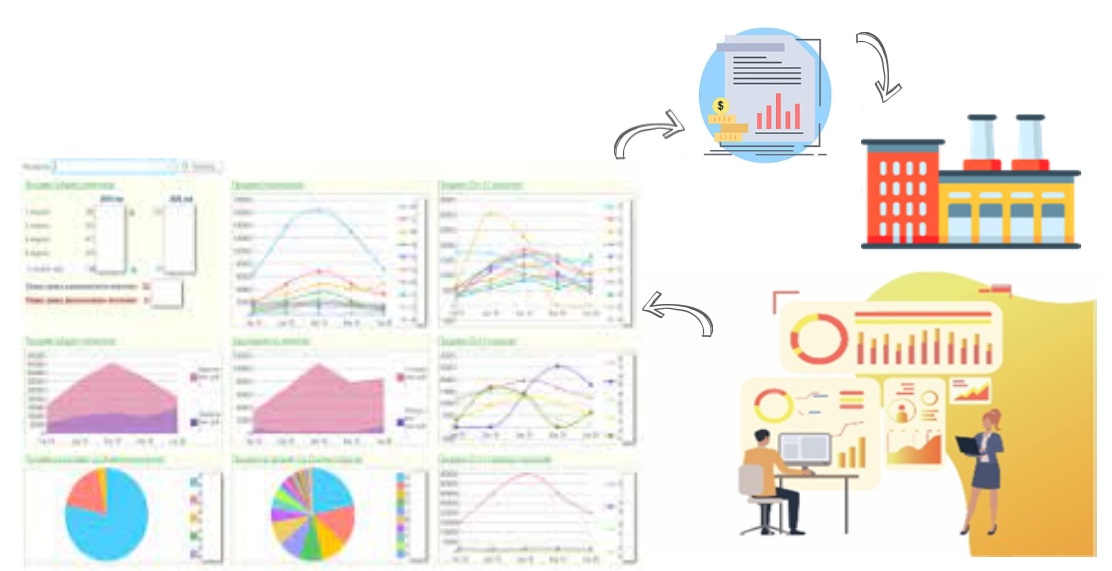Method approaches to assessing the adaptation potential of the industrial pharmaceutical enterprise to changing economic conditions
DOI:
https://doi.org/10.15587/2519-4852.2023.290171Keywords:
resource factor adaptive management, industrial pharmaceutical enterprise, management, organization, adaptation potential, influencing factors, macro environmentAbstract
The aim of the article is to develop a methodology for assessing the potential of IPE adaptation to changes in external conditions and internal influencing factors.
Materials and methods. The research used the methods of theoretical generalization, analysis and synthesis, correlation analysis and expert survey.
Results. It is proposed to define the essence of the adaptation potential of an industrial pharmaceutical enterprise to changes in business conditions, under which it is appropriate to understand the enterprise's readiness to respond flexibly, quickly, and adequately to changes occurring in the external and internal environment, in order to increase its level of competitiveness. A technique for determining the level of industrial adaptation potential (the technique cannot be a model; the technique is stages that are related to each other) and a ranking model by its degree by parametrization is proposed. Based on the study of scientific works and the experience of global companies, it was determined that the model for ranking the level of adaptation potential by parameterization involves ranking elements according to the degree of readiness of the management system of an industrial pharmaceutical enterprise for adaptation. The components of parameters for assessing the adaptation potential of an industrial pharmaceutical enterprise have been formed. The limits of adaptation potential are defined.
Conclusions. A methodology for assessing the adaptation potential of industrial pharmaceutical enterprises to the influence of external factors (martial law, the outflow of qualified personnel, a decrease in the purchasing power of the population, etc.) and taking into account the internal capabilities of the enterprise (resources (material, financial, labour, information, service, etc.), organizational structure and management decision-making) with the aim of increasing the competitiveness of the enterprise and its fulfilment of the social component of functioning, namely timely provision of the population with high-quality medicines in full in the right place at affordable prices.
References
- Sahaidak-Nikitiuk, R., Holybtsova, K., Demchenko, N., Nikitiuk, V. (2021). Directions for improving adaptive management efficiency of manufacturing pharmaceutical companies. EUREKA: Health Sciences, 5, 61–68. doi: https://doi.org/10.21303/2504-5679.2021.002052
- Siketina, N. H.; Bezpartochnyi, M., Britchenko, I. (Eds.) (2019). Adaptive development of competitive advantages of an industrial enterprise on the basis of analysis and ensuring the competitiveness of its products. Conceptual aspects management of competitiveness the economic entities. Vol. 2. Przeworsk: WSSG, 98–107.
- Sangawi, B. The Impact of External Environment on Organization Adaptation. Available at: http://www.academia.edu/25319301/The_Impact_of_External_Environment_on_Org anization_Adaptation
- Stevenson, W. J. (2018). Operations Management. Irwin: McGraw-Hill, 890.
- Stolyarov, V., Psztorov, J., Zos-Kior, M., Hnatenko, I., Petchenko, M. (2022). Optimization of material and technical supply management of industrial enterprises. Naukovyi Visnyk Natsionalnoho Hirnychoho Universytetu, 3, 163–167. doi: https://doi.org/10.33271/nvngu/2022-3/163
- Adobor, H. (2020). Supply chain resilience: an adaptive cycle approach. The International Journal of Logistics Management, 31 (3), 443–463. doi: https://doi.org/10.1108/ijlm-01-2020-0019
- Dumont, G. A., Huzmezan, M. (2002). Concepts, methods and techniques in adaptive control. Proceedings of the 2002 American Control Conference (IEEE Cat. No.CH37301). doi: https://doi.org/10.1109/acc.2002.1023173
- Endres, H. (2018). Adaptability Through Dynamic Capabilities: How Management Can Recognize Opportunities and Threats. Wiesbaden: Gabler Verlag, 184. doi: https://doi.org/10.1007/978-3-658-20157-9
- Desai, H., Maneo, G., Pellfolk, E., Schlingheider, A. (2018). Managing to Adapt: Analysing adaptive management for planning, monitoring, evaluation, and learning. doi: https://doi.org/10.21201/2017.2159
- Arefieva, O., Tulchynska, S., Popelo, O., Arefiev, S., Tkachenko, T. (2021). The Economic Security System in the Conditions of the Powers Transformation. IJCSNS International Journal of Computer Science and Network Security, 21 (7), 35–42.
- Deineha, O., Chymosh, K., Kobylynska, T., Nazarov, O., Liapa, M., Sapotnitska, N. (2021). Adaptive Management of Transport Logistics in Agricultural Enterprises. Journal of Agriculture and Crops, 81, 20–26. Internet Archive. doi: https://doi.org/10.32861/jac.81.20.26
- Wang, P. (2018). Application of adaptive algorithm in paper mills enterprise management. Paper Asia, 1 (8), 160–153.
- Kir, H., Erdogan, N. (2021). A knowledge-intensive adaptive business process management framework. Information Systems, 95, 101639. doi: https://doi.org/10.1016/j.is.2020.101639
- Islam, Md. W., Ruhanen, L., Ritchie, B. W. (2018). Adaptive co-management: A novel approach to tourism destination governance? Journal of Hospitality and Tourism Management, 37, 97–106. doi: https://doi.org/10.1016/j.jhtm.2017.10.009
- Küffner, C., Münch, C., Hähner, S., Hartmann, E. (2022). Getting back into the swing of things: The adaptive path of purchasing and supply management in enhancing supply chain resilience. Journal of Purchasing and Supply Management, 28 (5), 100802. doi: https://doi.org/10.1016/j.pursup.2022.100802
- Farhshatova, O., Zaharov, S., Vereskun, M., Kolosok, V. (2019). Formation of Competitive Advantages of the Enterprise Based on Adaptive Management. Marketing and Management of Innovations, 1, 244–256. doi: https://doi.org/10.21272/mmi.2019.1-21
- Starikova, M. S., Mishin, D. A., Nikitina, E. A. (2016). Assessment of Quality of Adaptive Management of Industrial Corporation in the Competitive Environment. International Journal of Pharmacy & Technology, 8 (4), 22473–22485.
- Gannon, K. E., Crick, F., Atela, J., Conway, D. (2021). What role for multi-stakeholder partnerships in adaptation to climate change? Experiences from private sector adaptation in Kenya. Climate Risk Management, 32, 100319. doi: https://doi.org/10.1016/j.crm.2021.100319
- Sahaidak-Nikitiuk, R., Holybtsova, K., Demchenko, N., Zarichkova, M. (2020). Theoretical and applied aspects of adaptive management of manufacturing pharmaceutical enterprises of Ukraine. ScienceRise: Pharmaceutical Science, 6 (28), 68–73. doi: https://doi.org/10.15587/2519-4852.2020.222219
- Haddow, G. D., Bullock, J. A., Coppola, D. P. (2020). Emergency Management. Elsevier, 533. doi: https://doi.org/10.1016/c2018-0-00417-x
- Kiran, D. R. (2022). Principles of management. Principles of Economics and Management for Manufacturing Engineering, 95–103. doi: https://doi.org/10.1016/b978-0-323-99862-8.00011-x
- Attanasi, G., Manzoni, E. (2021). Experimetrics: Econometrics for Experimental Economics, Peter G. Moffatt. London: Palgrave Macmillan. Journal of Economic Psychology, 90, 102472. doi: https://doi.org/10.1016/j.joep.2021.102472
- Barnett, W. A., Diewert, W. E., Maasoumi, E. (2016). Innovations in measurement in economics and econometrics: An overview. Journal of Econometrics, 191 (2), 273–275. doi: https://doi.org/10.1016/j.jeconom.2015.12.015

Downloads
Published
How to Cite
Issue
Section
License
Copyright (c) 2023 Andrii Cherniavskyi, Rita Sahaidak-Nikitiuk, Daryna Tarasenko, Nataliya Demchenko, Vitalii Nikitiuk

This work is licensed under a Creative Commons Attribution 4.0 International License.
Our journal abides by the Creative Commons CC BY copyright rights and permissions for open access journals.






